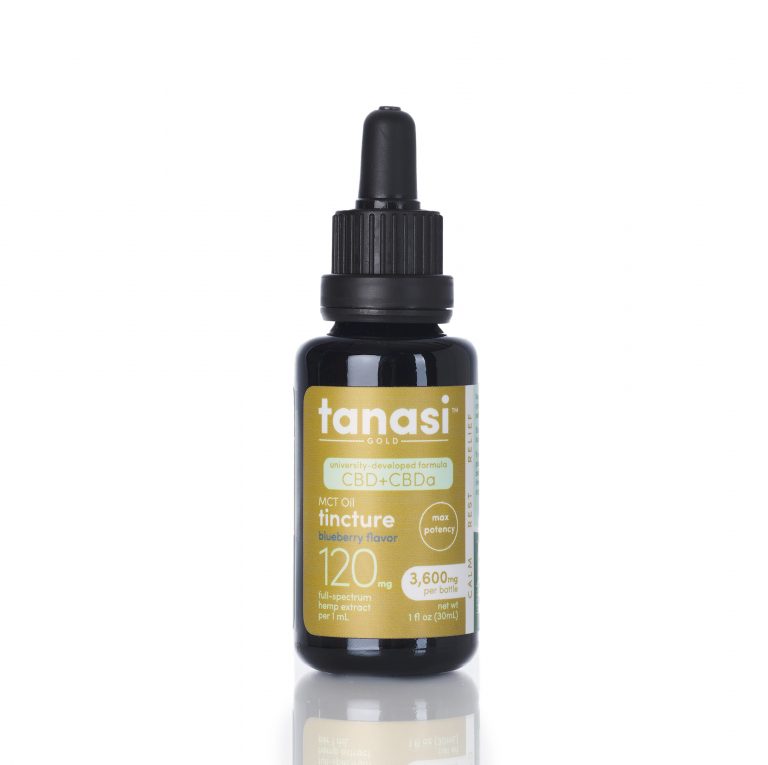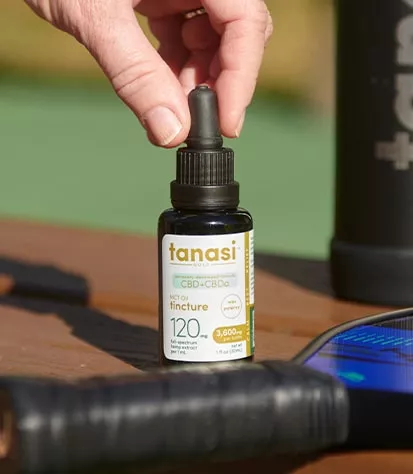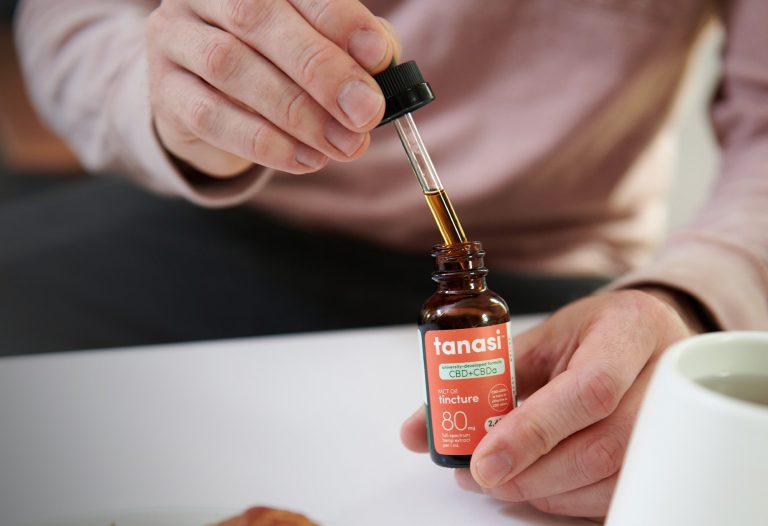Can You Cook with MCT Oil?
Posted on March 10th, 2023
You may have heard about MCT oil and the whispers of it being a superfood. It is a must-have for people on ketogenic diets, who swear it works wonders for them. Here at Tanasi, we also love to use this supplement as a carrier oil for our CBD + CBDa products, maximizing the efficacy of our patent-pending, 1:1 formulation that’s backed by research you can explore here.
Now, when mixed into other products, like Tanasi’s hemp extracts, MCT oil’s taste is barely noticeable. But MCT oil doesn’t taste great on its own. And it’s not so common place in supermarket shelves. So many people wonder, what is this product, and can you cook with MCT oil? If you have these questions, read on, as we will discuss all of this and more in the below guide.
 What Is MCT Oil?
What Is MCT Oil?
Before we can dive into whether or not you can cook with MCT oil, we need to understand what exactly MCT oil is. MCT stands for medium-chain triglycerides. (These are a form of saturated fatty acids. ) You find these fat molecules in coconut oil, palm kernel oil, and dairy products such as cheese, milk, and yogurt. Any kind of fats is made up of carbon atom chains, but most of the fats in your diet are composed of 13 to 21 of these atoms. These are typically referred to as long-chain fatty acids. Most dietary sources of fat, such as avocado, fish, and olive oil, comprise these long-chain triglycerides. Then, there are short-chain fats, usually made of 6 or fewer carbon atoms. Finally, since MCTs are medium-chain, their composition lies in the middle, containing between 6 to 12 carbon atoms.
Since MCTs are medium in length, your body doesn’t need to use bile acid or enzymes to digest them, which is not the case with their long-chain counterparts. Therefore, they can deliver more immediate energy. And if they’re not used for energy, they are turned into ketones, which can be used for energy instead of glucose. Ketones are far less reactive in the body than glucose; therefore, an energy boost from MCT oil is steady and does not fluctuate the way glucose does.
There are four types of MCTs, and they include:
- Caproic acid – 6 carbon atoms
- Caprylic acid – 8 carbon atoms
- Capric acid – 10 carbon atoms
- Lauric acid – 12 carbon atoms
Caproic and caprylic acid strains contain fewer carbon atoms, so they take less work for the body to process. During the MCT oil-making process, lauric acid and capric acid are usually removed to make a high-quality product that is more palatable.
Dietary Benefits of MCT Oil
There are ways using MCT oil may be beneficial. These include:
Potential to Aid in Weight Loss
One of the main reasons many people take MCT oil is for its potential weight loss benefits. You can incorporate it into your diet, while still exercising, to achieve your end goal faster. It might help reduce weight in the following ways:
- MCT oils have a lower calorie content than other fats, such as LCTs. Therefore, you will have a lower calorie intake when taking MCTs as opposed to LCTs.
- Medium-chain triglycerides are digested and metabolized so quickly that the body uses them immediately as opposed to storing them. LCTs, on the other hand, take longer to digest, so by the time LCTs get to the liver, other energy sources such as sugar and MCTs are already being used to fuel the cells. The body then stores the LCTs as fat.
- MCTs also have the potential to increase your satiety; hence you might find yourself eating less food. They could reduce your appetite and increase feelings of fullness.
It Is a Source of Energy
MCT oil could give an instant energy boost to the body. When consumed, MCT oil raises your ketones, which fuel your brain and muscles. Beta-hydroxybutyrate (BHB) is the primary ketone produced in the ketosis process and is sometimes considered a super fuel. This is because of its ability to provide more energy as compared to glucose.
 Can You Cook With MCT Oil?
Can You Cook With MCT Oil?
The answer to this question is an emphatic yes! However, it is crucial to note that you should not expose MCT oil to temperatures above 320 degrees Fahrenheit due to its low smoking point.
Below are some of the reasons why people may choose to cook with MCT Oil.
It Is Flavorless
MCT oil is flavorless, which makes it the perfect oil to use while cooking. After all, it can work well with any dish, without adding its flavor to the completed meal.
No Melting Will Be Required
Luckily for lazy chefs, MCT oil does not turn into a solid at room temperature, as some other oils do. You, therefore, do not need to waste time melting it while cooking.
It Combines Well With Other Supplements
MCT oil can easily combine with other supplements, such as CBD, whey protein and collagen peptides. This may allow you to mix things up in your supplement routine.
Cooking With MCT Oil
When cooking with MCT oil, it is crucial to note that you should use only low to medium temperatures. It has a lower smoking point than coconut oil, which is 320°F. Coconut has a smoking point of 350°F. When you use MCT oil for cooking at a higher temperature than 320°F, you risk damaging the fats, making the end product less beneficial.
Other Ways to Use MCT Oil
There are myriads of ways in which you can use MCT oil in your food. Some of them include:
Drizzling It on Your Food
This is an exciting way to add healthy fats to your diet. You can drizzle it into your favorite keto sauces and dressings. You can also drizzle it onto keto pasta dishes and salads. Better yet, get your MCT oil with your daily dose of CBD + CBDa by adding a few drops of Tanasi’s tincture to your meal.
Blend It Into Your Beverages
MCT oil, if not blended into your favorite drinks, will float at the top, which is not very appetizing. If you do not prefer blending recipes, you can try emulsified MCT. It will mix well into beverages, without any blending required. You can add it into your morning coffee to get your day started on the right foot.
Substitute for Your Usual Cooking Oils
You can also substitute your regular oils with MCT. If you have a recipe that asks for olive oil, coconut, or even vegetable oil, you can replace it with MCT oil.
Workout Shakes
You can incorporate it into your pre-workout and post-workout shakes. This could change up your fitness journey.
How to Store Your MCT Oil
How do you store your MCT oil to preserve its shelf life? When stored correctly, MCT can last up to 2 years, in a cool and dry place. It is advised to avoid storing it where there is too much light, oxygen, and heat, to prevent it from oxidizing and extend its shelf life.
It is recommended to look for MCT oil that comes in a glass container as opposed to a plastic container as some plastic containers may have chemicals that could enter the oil.
If your MCT oil is already in a plastic container, then you might consider storing it in a fridge. If possible, you could also transfer the oil into a glass container and store it in a cool and dry place.
Final Thoughts
MCT oil, as seen above, may be a great addition to your daily supplements. By making it part of your daily routine, whether you cook with MTC oil or use it in your food, you might enjoy a more exciting diet. There are so many ways to add MCT oil to your diet. When cooking with MCT oil, it’s important to remember that it has a low smoking point, so it’s not the best choice for pan-frying and stir-frying, since both are cooking methods that have a higher smoking point.

Related Posts in MCT Oil

May 3 2023
Does MCT Oil Go Bad? How To Maximize Freshness and Identify Bad Oil
Read More →
Apr 13 2023
When Is the Best Time to Take MCT Oil with CBD + CBDa?
Read More →
Apr 7 2023
8 MCT Oil Effects: Why Tanasi Chooses This Carrier Oil
Read More →
Mar 21 2023
 What Is MCT Oil?
What Is MCT Oil? Can You Cook With MCT Oil?
Can You Cook With MCT Oil?